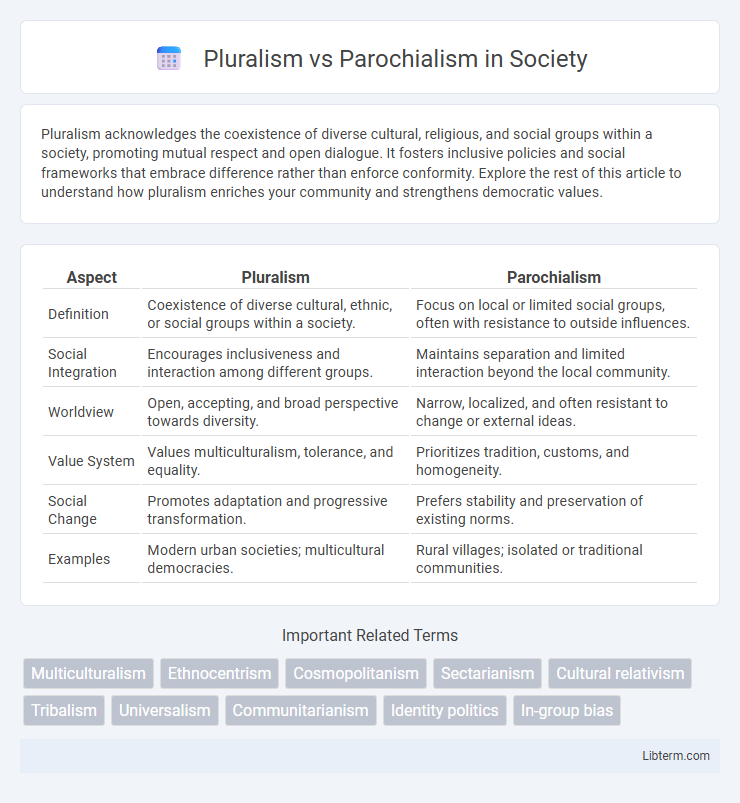Pluralism acknowledges the coexistence of diverse cultural, religious, and social groups within a society, promoting mutual respect and open dialogue. It fosters inclusive policies and social frameworks that embrace difference rather than enforce conformity. Explore the rest of this article to understand how pluralism enriches your community and strengthens democratic values.
Table of Comparison
| Aspect | Pluralism | Parochialism |
|---|---|---|
| Definition | Coexistence of diverse cultural, ethnic, or social groups within a society. | Focus on local or limited social groups, often with resistance to outside influences. |
| Social Integration | Encourages inclusiveness and interaction among different groups. | Maintains separation and limited interaction beyond the local community. |
| Worldview | Open, accepting, and broad perspective towards diversity. | Narrow, localized, and often resistant to change or external ideas. |
| Value System | Values multiculturalism, tolerance, and equality. | Prioritizes tradition, customs, and homogeneity. |
| Social Change | Promotes adaptation and progressive transformation. | Prefers stability and preservation of existing norms. |
| Examples | Modern urban societies; multicultural democracies. | Rural villages; isolated or traditional communities. |
Understanding Pluralism: Definition and Core Principles
Pluralism refers to a social and political framework that acknowledges and respects diversity within a society, promoting equal coexistence of multiple cultural, religious, or ethnic groups. Core principles of pluralism include acceptance of differences, active dialogue among diverse communities, and institutional support for minority rights to foster inclusion and mutual respect. Understanding pluralism requires recognizing the value of diversity as a strength that enriches democratic processes and social cohesion.
Parochialism Explained: Origins and Characteristics
Parochialism originates from localized mindsets that limit awareness and acceptance of broader cultural or social perspectives, often rooted in historical isolation or homogeneous communities. It is characterized by narrow viewpoints, resistance to external influence, and prioritization of local customs over global understanding. This mindset fosters ethnocentrism, restricting openness to diverse ideas and hindering cross-cultural collaboration.
Historical Context: Evolution of Pluralism and Parochialism
Pluralism and parochialism evolved significantly throughout history, with pluralism emerging prominently during the Enlightenment as societies shifted toward recognizing diversity and inclusive governance. Parochialism, rooted in localized or insular perspectives, dominated earlier feudal and tribal societies where community boundaries defined social and political life. The historical tension between these concepts reflects the broader evolution from fragmented, homogeneous groups to complex, heterogeneous nations embracing multicultural integration.
Key Differences: Pluralism vs Parochialism
Pluralism emphasizes acceptance and coexistence of diverse cultural, social, or political groups within a society, promoting inclusiveness and mutual respect. Parochialism, by contrast, centers on a narrow focus confined to local interests, traditions, and perspectives, often resisting external influences or broader societal integration. Key differences lie in pluralism's openness to diversity versus parochialism's preference for insularity and limited outlook.
Social Impacts: Inclusivity Versus Exclusivity
Pluralism fosters social inclusivity by encouraging the recognition and acceptance of diverse cultural, ethnic, and religious groups, leading to enriched community interactions and reduced social tensions. Parochialism, in contrast, promotes exclusivity by prioritizing local or narrow group interests, often resulting in social fragmentation and marginalization of outsiders. The social impact of pluralism supports cohesive societies with shared respect, whereas parochialism can reinforce divisions and limit social mobility.
Pluralism in Modern Society: Benefits and Challenges
Pluralism in modern society promotes cultural diversity, fostering innovation and mutual respect among various ethnic, religious, and social groups. It encourages democratic participation and equal rights, enhancing social cohesion and economic development by embracing different perspectives. However, challenges such as potential social fragmentation and conflicts arising from competing values require effective policies to balance integration and diversity.
The Limitations of Parochial Thinking
Parochial thinking limits perspectives by confining understanding to local or narrow contexts, hindering effective decision-making in diverse, globalized environments. This mindset often results in biases and resistance to new ideas, reducing adaptability and innovation. Embracing pluralism counters these limitations by promoting inclusivity and broader, more flexible viewpoints.
Pluralism and Parochialism in Global Politics
Pluralism in global politics emphasizes the coexistence of diverse groups and the recognition of multiple sources of authority beyond the state, such as international organizations, NGOs, and transnational corporations, facilitating cooperation and conflict resolution on a global scale. Parochialism, conversely, refers to a narrow focus on local or national interests, often leading to resistance against external influences and reluctance to engage in international cooperation. Understanding the tension between pluralism and parochialism is essential for analyzing state behavior, diplomatic relations, and the effectiveness of global governance institutions like the United Nations and the World Trade Organization.
Education’s Role in Fostering Pluralistic or Parochial Attitudes
Education plays a crucial role in shaping societal attitudes by promoting either pluralism or parochialism. Curricula that emphasize cultural diversity, critical thinking, and global awareness foster pluralistic mindsets, enabling students to appreciate multiple perspectives and engage constructively in multicultural societies. Conversely, education systems that prioritize local traditions and insulate students from broader worldviews often reinforce parochial attitudes, limiting openness to diverse ideas and inhibiting social cohesion in increasingly interconnected environments.
Building a Balanced Society: Embracing Pluralism Over Parochialism
Building a balanced society requires embracing pluralism, which fosters diversity, inclusivity, and open dialogue among different cultural, religious, and social groups. Pluralism encourages mutual respect and understanding, contributing to social cohesion and reducing conflicts rooted in parochialism's narrow, insular perspectives. Prioritizing pluralistic values enhances democratic governance, economic innovation, and global cooperation, essential for thriving multicultural communities.
Pluralism Infographic

 libterm.com
libterm.com